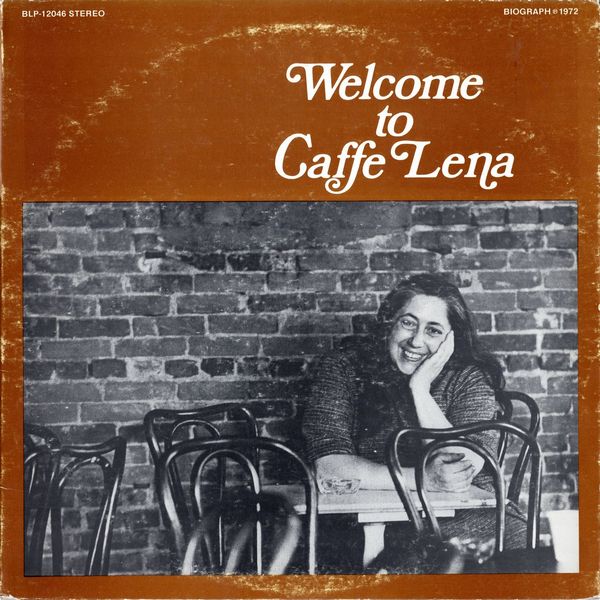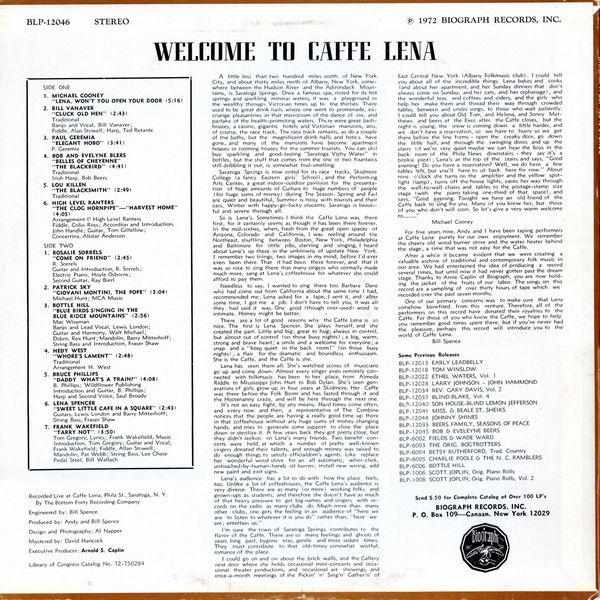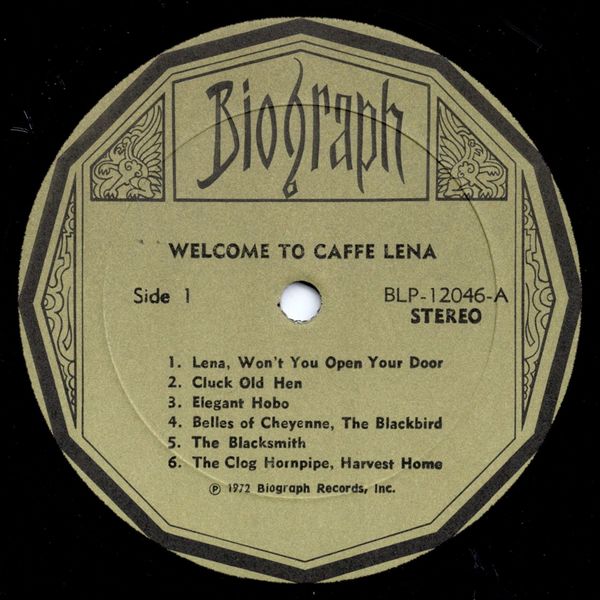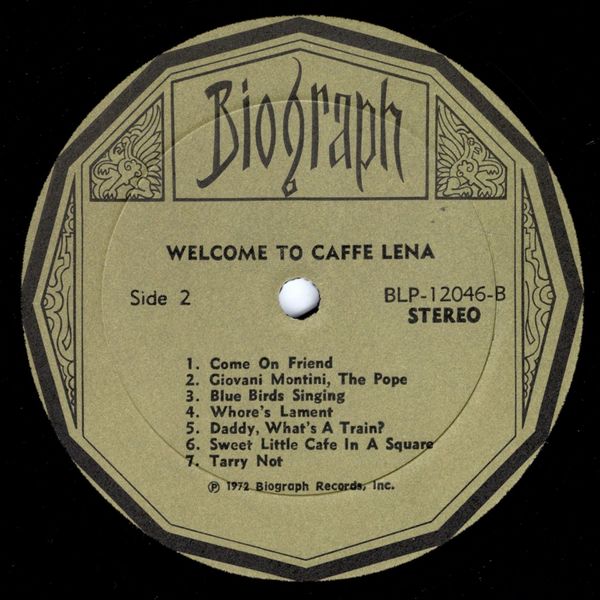
 |


 |
Sleeve Notes
A little less than two hundred miles north of New York City, and about thirty miles north of Albany, New York, somewhere between the Hudson River and the Adirondack Mountains, is Saratoga Springs. Once a famous spa, noted for its hot springs and sparkling mineral waters, it was a playground or the wealthy through Victorian times up to the thirties. There used to be great drink hails where one went to promenade, exchange pleasantries in that microcosm of the dance of lite, and partake of the health-promoting waters. There were great bathhouses, a casino, gigantic hotels and Victorian mansions, and, of course, the race track. The race track remains, as do a couple of the baths, but the magnificent drink halls and hotels have gone, and many of the mansions have become apartment houses or rooming houses for the summer tourists. You can still buy sparkling and good-tasting "Saratoga Vichy Water" in bottles, but the stuff that comes from the one or two fountains still dribbling it out, is somewhat foul-smelling.
Saratoga Springs is now noted for its race tracks, Skidmore College (a fancy Eastern girls' School), and the Performing Arts Center, a great indoor-outdoor pavillion for the presentation of huge amounts of Culture to huge numbers of people (for huge sums of money) during The Season. Spring and Fall are quiet and beautiful, Summer is noisy with tourists and their cars, Winter with happy-go-lucky students. Saratoga is beautiful and serene through all.
So is Lena's. Sometimes I think the Caffe Lena was there first, for it certainly seems as though it has been there forever. In the mid-sixties, when, fresh from the great open spaces of Arizona, Colorado and California, I was reeling around the Northeast, shuffling between Boston, New York, Philadelphia and Baltimore for little jobs, starving and singing, I heard about Lena's up there in the unknowns of upstate New York.
I remember two things, two images in my mind, before I'd ever even been there. That it had been there forever, and that it was so nice to sing there that many singers who normally made much more, sang at Lena's coffeehouse for whatever she could afford to pay them.
Needless to say, I wanted to sing there too. Barbara Dane who had come out from California about the same time I had, recommended me; Lena asked for a tape, I sent it, and after some time, I got me a job. I don't have to tell you, it was all they had said it was. One good (though over-used) word is intimate. Homey might be better.
There are a lot of good reasons why the Caffe Lena is so nice. The first is Lena Spencer. She plays herself, and she created the part. Little and big; great to hug; always in control, but almost out of control (on those busy nights); a big, warm, strong and brave heart; a smile and a welcome for everyone; a snap and a "keep quiet in the back room!" (on those busy nights); a flair for the dramatic and boundless enthusiasm. She is the Caffe, and the Caffe is she.
Lena has seen them all. She's watched scores of musicians go up and come down. Almost every singer even remotely connected with folkmusic has been to her place, from Almeda Riddle to Mississippi John Hurt to Bob Dylan. She's seen generations of girls grow up in four years at Skidmore. Her Caffe was there before the Folk Boom and has lasted through it and the Hootenanny craze, and will be here through the next one.
It's not an easy fight, by any means. Hard times come often, and every now and then, a representative of The Combine notices that the people are having a really good time up there in that coffeehouse without any huge sums of money changing hands, and tries to generate some support to close the place down or sterilize it. A few years back they got pretty close, but they didn't reckon on Lena's many friends. Two benefit concerts were held, at which a number of pretty well-known singers donated their talents, and enough money was raised to do enough things to satisfy officialdom's agents. Like replace her wonderful wood stove for an all automatic, whirr-click, untouched-by-human-hands oil burner, install new wiring, add new paint and exit signs.
Lena's audience has a lot to do with how the place feels, too. Unlike a lot of coffeehouses, the Caffe Lena's audience is very diverse. There are as many (or more) working folks and grown-ups as students, and therefore she doesn't have as much of that heavy pressure to get big names and singers with records on the radio as many clubs do. Much more than many other clubs, one gets the feeling in an audience of "here we are to listen to whatever it is you do" rather than, "here we are; entertain us."
I'm sure the town of Saratoga Springs contributes to the flavor of the Caffe. There are so many feelings and ghosts of years long past, bygone eras, gentle and more sedate times. They must contribute to that old-timey somewhat wistful, romance of the place.
I could go on and on about the brick walls, and the Gallery next door where she holds occasional mini-concerts and occasional theater productions, and occasional art showings, and once-a-month meetings of the Pickin' 'n' Sing'n' Gather'n' of East Central New York (Albany Folkmusic club). I could tell you about all of the incredible things Lena bakes and cooks (and about her apartment, and her Sunday dinners that don't always come on Sunday, and her cats, and her orphanage), and the wonderful teas and coffees and ciders, and the girls who help her make them and thread their way through crowded tables, between and under songs, to those who wait patiently.
I could tell you about Old Tom, and Helena, and Sonny Matthews and beers at the Exec after the Caffe closes, but the night is young, the snow is coming down a little harder, and we don't have a reservation, so we have to hurry so we get there before the line forms — open the creaky door, go down the little hall, and through the swinging doors and up the stairs (if we're very quiet maybe we can hear the boys in the back room of the Phila News downstairs — they say it's a bookie joint); Lena's at the top of the stairs and says, "Good evening! Do you have a reservation? Well, we do have a few tables left, but you'll have to sit back here for now." About nine o'clock she turns on the amplifier and the yellow spotlight (lamp), turns off the house lights, eases her way through the wall-to-wall chairs and tables to the postage-stamp size stage (with the piano taking one-third of that space), and says, "Good evening. Tonight we have an old friend of the Caffe back to sing for you. Many of you know her, but those of you who don't will soon. So let's give a very warm welcome to … "
Michael Cooney
For five years now, Andy and I have been taping performers at Caffe Lena purely for our own enjoyment. We remember the cheery old wood burner stove and the water heater behind the stage; a time that was not easy for the Caffe.
After a while it became evident that we were creating a valuable archive of traditional and contemporary folk music in our area. We had entertained the idea of producing a record several times, but until now it had never gotten past the dream stage. Thanks to Arnie Caplin of Biograph, you are now holding the jacket of the fruits of our labor. The songs on this record are a sampling of over thirty hours of tape which we recorded over the past seven months.
One of our primary concerns was to make sure that Lena somehow benefited from this venture. Therefore, all of the performers on this record have donated their royalties to the Caffe. For those of you who know the Caffe, we hope to help you remember good times spent there, but if you've never had the pleasure, perhaps this record will introduce you to the world of Caffe Lena.
Bill Spence